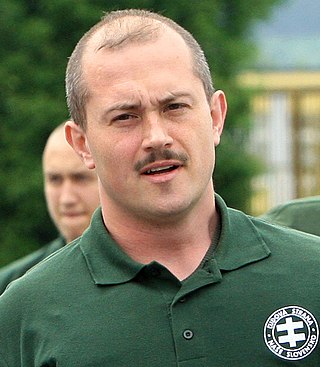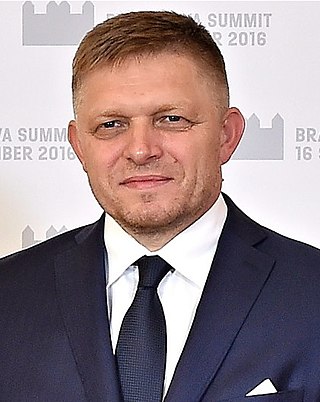Politics of Slovakia takes place in a framework of a parliamentary representative democratic republic, with a multi-party system. Legislative power is vested in the parliament and it can be exercised in some cases also by the government or directly by citizens.

Mikuláš Dzurinda is a Slovak politician who was the prime minister of Slovakia from 30 October 1998 to 4 July 2006. He is the founder and leader of the Slovak Democratic Coalition (SDK) and then the Slovak Democratic and Christian Union. From 2002 to 2006, his party formed a coalition government with the Christian Democratic Movement, the Alliance of the New Citizen and the Party of the Hungarian Coalition.

Monika Beňová is a Slovak politician who has been a member of the European Parliament since 2004. She is a member of the centre-left Direction-Social Democracy party SMER-SD. SMER-SD is a member of the Party of European Socialists. She presently serves on the Committee on the Environment, Public Health and Food Safety. At the same time she serves as a Quaestor of the European Parliament and therefore she is a member of the European Parliament's Bureau. In present she has opposite views as her mother party - Smer, for example on European Union, NATO, LGBTQ rights in Slovakia, conflict in Ukraine and so on.

The Trenčín Region is one of the eight Slovak administrative regions. It consists of 9 districts (okresy). The region was established in 1996: previously it had been a part of the West Slovak Region and partly the Central Slovak Region. Industry is a major sector of the region's economy.

The Nitra Region is one of the administrative regions of Slovakia. It was first established in 1923 and from 1996 exists in its present borders. It consists of seven districts and 354 municipalities, from which 16 have a town status. The economy of the region focuses more on agriculture, than in other Slovak regions. Nitra is its seat, largest city, and cultural and economic center.

The Bratislava Region is one of the administrative regions of Slovakia. Its capital is Bratislava. The region was first established in 1923 and its present borders exist from 1996. It is the smallest of the eight regions of Slovakia as well as the most urbanized, most developed and most productive by GDP per capita.

Vladimír Maňka is a Slovak politician and Member of the European Parliament (2004–2019) with the Direction, part of the Socialist Group.

The Banská Bystrica Region is one of the eight regions of Slovakia. It is the largest region by area, and has a lower population density than any other region. The Banská Bystrica Region was established in 1923; its borders were last adjusted in 1996. Banská Bystrica consists of 514 municipalities, 24 of which have town status. Its administrative center is the eponymous town of Banská Bystrica, which is also the region's largest town. Other important towns are Zvolen and Lučenec.

An election of the delegation from Slovakia to the European Parliament was held in 2009.
Elections were held in Slovakia's eight self-governing regions on 14 November 2009.

The Party of Civic Understanding was a centre-left political party in Slovakia between 1998 and 2003. Between 1998 and 2002 the party was part of the coalition government led by Mikuláš Dzurinda, with the founder of the party, Rudolf Schuster, being elected President of Slovakia in 1999.

Marian Kotleba is a Slovak politician and leader of the far-right, neo-Nazi political party Kotlebists – People's Party Our Slovakia.
The following lists events that happened during 2015 in Slovakia.

Parliamentary elections were held in Slovakia on 5 March 2016 to elect the 150 members of the National Council. The ruling left-wing populist Direction – Social Democracy (SMER–SD) party remained the strongest party, but lost its majority. The Slovak Democratic and Christian Union – Democratic Party (SDKÚ-DS), which led the government between 2000–06 and 2010–12, was defeated heavily, failing to cross the electoral threshold and losing its representation in the National Council. The centre-right Christian Democratic Movement (KDH) also failed to cross the threshold for the first time since 1990, whilst the far-right nationalist Kotleba – People's Party Our Slovakia (ĽSNS) entered parliament for the first time.

Regional elections were held in France on 6 and 13 December 2015. At stake were the regional councils in metropolitan and overseas France including the Corsican Assembly and inaugural seats in the Assembly of French Guiana and Assembly of Martinique, all for a six-year term. The Departmental Council of Mayotte, which also exercises the powers of a region, was the only region not participating in this election, having already been renewed on 2 April 2015. There were 18 regional presidencies at stake, with 13 in mainland France and Corsica, as well as 5 overseas. Though they do not have legislative autonomy, these territorial collectivities manage sizable budgets. Moreover, regional elections are often taken as a mid-term opinion poll.
Events in the year 2013 in Slovakia.
Ján Lunter is a Slovak entrepreneur, owner of a family food company and, following the November 2017 elections, governor of the Banská Bystrica Region.
Progressive Slovakia is a liberal and social-liberal political party in Slovakia established in 2017. The party is led by European Parliament vice-president Michal Šimečka. The party is led by Vice President of the European Parliament Michal Šimečka. It is a member of the Renew Europe group and is a full member of the Alliance of Liberals and Democrats for Europe Party. PS has three MEPs: Michal Šimečka, Martin Hojsík, and Michal Wiezik ; Wiezik left the EPP group and Spolu to join PS. Zuzana Čaputová, incumbent President of Slovakia, co-founder and former deputy leader of Progressive Slovakia, was nominated by the party in the 2019 Slovak presidential election, and won by standing for the anti-corruption, environmental and pro-European program. In the National Council, it is represented by deputy Tomáš Valášek elected for For the People, which he left in 2021. In local politics, PS has a dominant position in Bratislava, cooperating with Team Bratislava and Freedom and Solidarity.
The 2018 Slovak local elections were held on Saturday, 10 November 2018, to elect deputies to municipality councils, city councils and mayors, including mayors of boroughs and members of their councils in Bratislava and Košice.
The Alliance is a political party in Slovakia that was founded by merging three political parties representing the Hungarian minority: the Party of the Hungarian Community, Most–Híd, and MKÖ–MKS. The party was founded on 22 November 2019 as an electoral alliance to run in the 2020 parliamentary election and was called the Hungarian Community Co-operation. MKÖ–MKS consisted of the "Összefogás–Spolupatričnosť" movement, SMK–MKP, and the Hungarian Forum.












